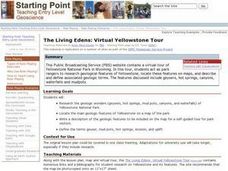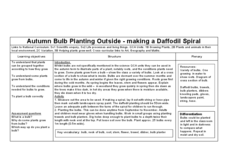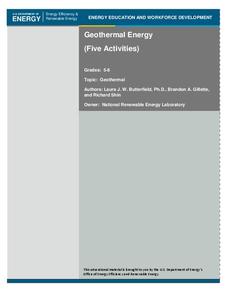Curated OER
WATER HERE AND THERE
Introduce the topic of water conservation with a little drama. Dressed as snowflakes, hail stones, or rain drops class members dramatize the events in a narration of the water cycle. The series of lessons that follow focus on...
Curated OER
The Story of Hot Springs, 1500-1900 AD
Students study the geology and hydrology of Arkansas hot springs and how they contributed to the development of the city of Hot Springs. They create advertisements for the city of Hot Springs and the therapeutic effects of the waters.
NOAA
Lost City Chemistry Detectives
In 1977, scientists discovered hot springs in the middle of deep, cold ocean waters near the Galapagos Islands. Scholars research the chemical reactions that explain what scientists found at the Lost City. A discussion connects many...
University of California
Hot! Hot! Hot!
Calories are not tiny creatures that sew your clothes tighter every night, but what are they? A science lesson, presented at multiple levels, has learners experiment with heat, heat transfer, and graph the function over time. It also...
Curated OER
Hot Weather, Rain Mean Fewer Pumpkins
Young scholars share their knowledge of pumpkins, then read a news article about how hot weather and rain are affecting the pumpkin crop. In this agriculture and current events lesson, the teacher introduces the article with a discussion...
Curated OER
The Living Edens: Virtual Yellowstone Tour
Students take an online virtual tour of Yellowstone National Park. They act as park rangers to research geological features of Yellowstone, locate these features on maps, and describe and define associated geologic terms.
Curated OER
Water Cycling in the Wilderness: Alaska quarter reverse
The Alaskan wilderness contains every imaginable element of the water cycle: it has flowing streams, cool spring rain, and frozen glaciers. Pupils use a series of worksheets to identify and define evaporation, condensation, and...
Curated OER
Some Like It Hot, Some Like It Cold
Students are explained that thermophiles are organisms that have optimal growth temperatures above 50oC. They investigate the temperature ranges for the growth of common bacteria. Students answer the question of do either of these...
Curated OER
Life's Big Questions: Where Did Life Come From?
Young scholars explore the life forms that live in the hot springs of Yellowstone. They examine how microscopic creatures can survive in these extreme conditions. Students perform experiments to observe growth samples and demonstrate...
Curated OER
The Hot Dog Stand: Combinations
In this combination worksheet, students rearrange integers to determine the number of combinations that can be made from given numbers. This one-page worksheet contains one combination problem.
Curated OER
Let's Go! Virtual Yellowstone Tour
Students research the geologic wonders of Yellowstone National Park. They locate the main geologic features of Yellowstone on a map of the park. Students write a description of the geologic features to be included on the map for a...
Curated OER
Autumn Bulb Planting Outside - Making a Daffodil Spiral
Students plant daffodil bulbs. In this gardening activity, students work outside to plant daffodil bulbs in the autumn so that they can grow roots and emerge by spring.
Curated OER
Egg-sceptional
Students design colored Easter eggs in this simple Art activity for the elementary classroom. The dye is created using almost boiling water and should be done by the teacher. This activity is ideal for the spring-time months and...
Curated OER
Observing Objects
Students observe the motion of both a pendulum and a spring pendulum . They then explain the differences and the similarities between the two types of motions.
Curated OER
Focus on Friction
The students learn about friction and forces through direct instruction and an investigation. They use measurement skills, observation skills, predicting, and drawing conclusions based on data collected during the investigation. Students...
Curated OER
Temperature School
Students observ the cooling and warming of room temperature, hot, and ice cold cans of water by measuring the change in temperature over time. They then attempt to develop explanations for the observations made and apply their findings...
Curated OER
Convection Currents
Students explain and understand the circulation of air in the atmosphere. They identify that energy can be carried from one place to another by heat flow or by waves, including water, light and sound waves, or by moving objects. ...
Curated OER
More About Water Below the Ground
Learners define groundwater. They identify groundwater's relationship to springs, artesian wells, ordinary wells and sinkholes. They describe the process by which sinkholes are formed. they define saltwater contamination and explain its...
Curated OER
Keeping Warm
Students place words describing a range from cold to hot on a scale. Using those words, they identify places on Earth which are cold, hot, freezing or boiling. They practice using and reading a thermometer with three different beakers...
Curated OER
Physical and Chemical Reactions - Factors Which Affect Reaction Rate
A total of five experiments lead chemistry pros to understand the difference between physical and chemical change. They also experiment with exothermic reaction factors that affect rate of reaction. The procedures are not written in the...
US Department of Energy
Geothermal Energy
With Earth Day quickly approaching, as well as many science fairs, why not challenge your class to investigate geothermal energy or other renewable energy resources? There are five driving questions explored in depth here, as well as...
Curated OER
I, Robot, Can Do That!
Assign groups of middle school oceanographers to research one of the following underwater robots; ABE, Herculues, ROPOS, RCV-150, Tiburon, or general purpose ROVs. An included handout guides them through information to be gathered. Each...
Curated OER
Where's Dinner?
Upcoming marine biologists consider a list of organisms residing near the Lost City hydrothermal vents and construct a food web. They compare the food web to that of a cold seep community, of which they should have previous knowledge....
Curated OER
Dante's Peak Movie Review
Middle or high school volcanologists watch the 1997 film, Dante's Peak. They make observations as they watch and then write a movie review, focusing on what was accurately represented. They also point out what facts were stretched by...

























